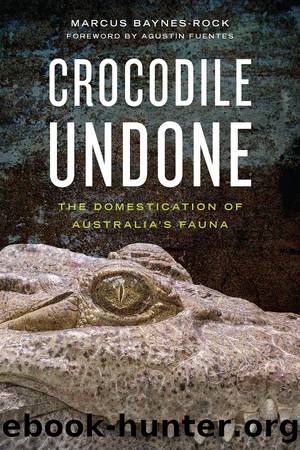Crocodile Undone by Marcus Baynes-Rock

Author:Marcus Baynes-Rock [Baynes-Rock, Marcus]
Language: eng
Format: epub
Tags: Social Science, Anthropology, Cultural & Social, Indigenous Studies, Nature, Animals, General, Ecology, Science, Life Sciences, Zoology, Ethology (Animal Behavior)
ISBN: 9780271087467
Google: m8vYDwAAQBAJ
Publisher: Penn State Press
Published: 2020-04-09T02:45:57+00:00
* * *
Alf Hornborg describes how modernity implies a âshift from concrete to abstract reference points.â38 Heâs talking about how the conception of self is reconfigured so that specific places and people are detachable from a personâs identity. But he also says that this objectification of self is in lockstep with the objectification of social relationships, and how both things tend toward alienation and fetishism. Iâve already described how conservation has traditionally served late modernity more faithfully than it has served ecological systems, how it has separated and abstracted things to a point where sets of numbers matter more than individuals. Here lies the irony in crocodile farming: what was born of a concern for conservation has, through its investment in particular animals, aggregated the abstract and concretized it to fit seamlessly with the paradigm of unmaking. Beyond factors like slow growth rate, diminishing clutch sizes, and exorbitant invoices for chicken carcasses, crocodile farming is up against late modernity itself. By directly engaging with crocodiles, in all of their idiosyncrasies, crocodile farmers are forced to engage with concreteness within a socioeconomic context that demands abstraction. Perhaps this works for a tourism business; on a farm tour, itâs far more entertaining to speak the names of crocodiles, tell their histories, and explain away their recalcitrance by reference to their relations with other crocs, people, the water, and the weather. But crocodile farming is primarily about producing quality skins, and this is made more difficult when particular crocodiles do particular thingsâparticularly fighting. Unlike a shed full of chickens, a farm full of crocs demands attention to the details of social relations. Farmers need to know who is bashing up whom, and how often. They need to think about what makes a particular crocodile behave in a certain way and work toward changing conditions to suit the croc. Farmers are dragged into the murky social worlds of crocodiles and made to accommodate their social needs. This is a direct challenge to unmaking and one that will not go unanswered. As much as farmers intend to approximate the wild, the crocodiles compel them to unmake their animalsâto separate males from males, eggs from nests, eggs and hatchlings from cold and predators; to vaccinate and inoculate; to isolate. These are the kinds of separations that define domestication. The external fence keeps the crocodiles in, but the internal fencing is also extensive. Crocodiles are separated from one another and from predators, parasites, fungi, and the weather. They must be in order for the farm to persist. And artificial insemination is a logical extension of what must inevitably occur in this domestication context; it is a solution to a problem of social, ecological complexity. When artificial insemination comes to fruition, a brute of a male with otherwise desirable traits need no longer be sold off because of his habit of killing females. He can be kept in isolation, digitally massaged, and mated remotely with females a fraction of his sizeâfemales who would not stand a chance of survival were they locked up with him in a pen.
Download
This site does not store any files on its server. We only index and link to content provided by other sites. Please contact the content providers to delete copyright contents if any and email us, we'll remove relevant links or contents immediately.
| Amphibians | Animal Behavior & Communication |
| Animal Psychology | Ichthyology |
| Invertebrates | Mammals |
| Ornithology | Primatology |
| Reptiles |
Sapiens: A Brief History of Humankind by Yuval Noah Harari(13084)
The Tidewater Tales by John Barth(12040)
Do No Harm Stories of Life, Death and Brain Surgery by Henry Marsh(6343)
Mastermind: How to Think Like Sherlock Holmes by Maria Konnikova(6257)
The Thirst by Nesbo Jo(5800)
Why We Sleep: Unlocking the Power of Sleep and Dreams by Matthew Walker(5664)
Sapiens by Yuval Noah Harari(4558)
Life 3.0: Being Human in the Age of Artificial Intelligence by Tegmark Max(4523)
The Longevity Diet by Valter Longo(4456)
The Rules Do Not Apply by Ariel Levy(3915)
The Immortal Life of Henrietta Lacks by Rebecca Skloot(3834)
The Body: A Guide for Occupants by Bill Bryson(3822)
Why We Sleep by Matthew Walker(3782)
Animal Frequency by Melissa Alvarez(3764)
Yoga Anatomy by Kaminoff Leslie(3713)
Barron's AP Biology by Goldberg M.S. Deborah T(3638)
The Hacking of the American Mind by Robert H. Lustig(3590)
All Creatures Great and Small by James Herriot(3528)
Yoga Anatomy by Leslie Kaminoff & Amy Matthews(3408)
